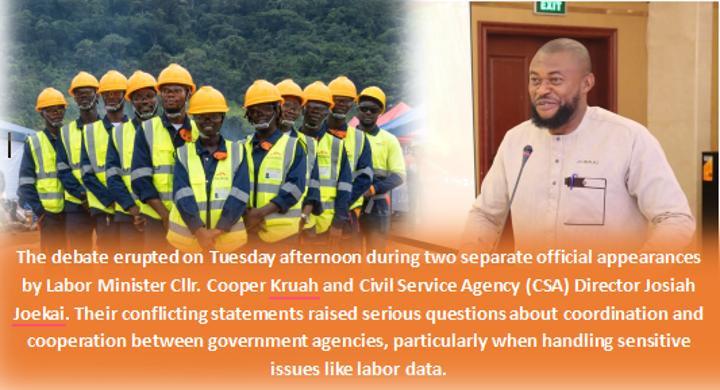Africa-Press – Liberia. A startling contradiction between two senior Liberian government officials has stirred national confusion over the number of foreign workers employed by ArcelorMittal Liberia (AML), raising concerns about inter-agency coordination and the credibility of official labor statistics.
The debate flared Thursday during separate public appearances by Labor Minister Cllr. Cooper Kruah and Civil Service Agency (CSA) Director General Josiah Joekai, who offered sharply divergent figures regarding AML’s foreign workforce.
At a press briefing hosted by the Ministry of Information, Labor Minister Kruah disclosed that just over 1,500 foreign nationals currently work for ArcelorMittal, mainly in technical roles linked to the company’s Phase II expansion project. He emphasized that these expatriates are employed in specialized engineering and construction roles required for the ongoing development of AML’s new iron ore concentrator, the upgrade of the Yekepa-to-Buchanan railway, and improvements to the Port of Buchanan.
However, while Minister Kruah’s remarks were still circulating in the press, a conflicting narrative emerged from Capitol Hill. During a presentation to the Liberian Senate, CSA Director Joekai claimed that over 3,000 foreign nationals—specifically “Indians”—are working for ArcelorMittal “through a company under the concession.”
Joekai’s statement raised eyebrows, especially given that the CSA does not have direct oversight over private-sector employment. He did not disclose the source of his data, nor did he clarify which roles he believed had been improperly assigned to foreigners instead of qualified Liberians.
“Many of these individuals are occupying jobs that Liberians are not only capable of doing but are also qualified for,” Joekai alleged.
His comments, though unverified, were swiftly amplified on social media. Nimba County Senator Nya Twayen, who has recently taken a vocal stance against ArcelorMittal following the dedication of its concentrator, posted on Facebook: “CSA Boss testifying at the Senate: There are 3,000 Indians working with ArcelorMittal doing jobs that Liberians should be doing.”
Labor Minister Kruah promptly pushed back in a subsequent interview, reminding the public that matters relating to private-sector labor, including work permits for expatriates, fall solely under the jurisdiction of the Ministry of Labor—not the CSA. He dismissed Joekai’s assertions as unauthorized and potentially misleading.
With the two top officials from the ruling Unity Party offering wildly different numbers, confusion mounted.
In an effort to clarify the situation, ArcelorMittal Liberia granted exclusive access to FrontPageAfrica to independently verify its employment data. The records reviewed by FPA present a different picture from Joekai’s claims.
As of the latest reporting date, full-time employees (FTEs) is 2,848. Of this Liberians worker are 2,555 (90%), expatriates: 293 (10%). Fixed-Term & Contractor Staff (as of April 30, 2025) is 6,147. Of this, Liberians are 4,705 (77%) and expatriates: 1,442 (23%).
Total Workforce 8,995, and Liberians: 7,260 (81%), while expatriates: 1,735 (19%).
According to AML, the expatriates are primarily specialists working on engineering, construction, and infrastructure projects under the expansion phase—roles for which local expertise remains limited.
The official data confirmed by FPA raises serious questions: Where did Joekai’s figure of 3,000 foreign workers—specifically “Indians”—originate? And why was it presented without validation?
Some observers are urging caution and calling on the CSA to produce verifiable, company-specific employment data—ideally sourced from the Ministry of Labor’s official work permit registry—if it is to substantiate such claims.
Observers say the discrepancy has ignited widespread debate and exposed a troubling lack of coordination among the government bodies tasked with labor regulation and oversight.
More broadly, the episode underscores a deeper concern: Are Liberia’s government institutions operating from a unified, credible set of labor data? Until this question is resolved, the public is left wondering who to trust.
Caught in the crossfire of confusion, the Liberian Senate may now be compelled to seek independent verification of AML’s workforce numbers to restore public confidence and ensure accountability.
Source: FrontPageAfrica
For More News And Analysis About Liberia Follow Africa-Press






